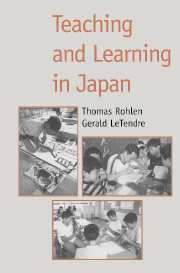Book contents
- Frontmatter
- Contents
- List of contributors
- Introduction: Japanese theories of learning
- Section I Fundamental approaches
- Section II The emotional foundations of early learning
- Section III School and classroom models
- Section IV Path and guidance
- Section V Artistic pursuits – old and new
- Conclusion: themes in the Japanese culture of learning
- References
- Index
Introduction: Japanese theories of learning
Published online by Cambridge University Press: 05 June 2012
- Frontmatter
- Contents
- List of contributors
- Introduction: Japanese theories of learning
- Section I Fundamental approaches
- Section II The emotional foundations of early learning
- Section III School and classroom models
- Section IV Path and guidance
- Section V Artistic pursuits – old and new
- Conclusion: themes in the Japanese culture of learning
- References
- Index
Summary
We see teaching and learning more clearly today, not just in Japan, but in all advanced societies. Learning is a major component of the intellectual consciousness of our day; we understand learning as something that occurs not just in schools and among children, but throughout society and throughout life. It is central to organizational change, social order, economic competition, and a host of other social processes. Viewed inclusively, the world of learning is rich in practices and understandings that vary in historical time, cultural space, and institutional context. The range of “things” to be learned is enormous – facts, endurance, maturity, peace of mind, empathy, physical coordination, judgment, persistence, morality, faith, concentration, trust, and so on. How these things are taught differs greatly from society to society and reflects basic understandings about such matters as human nature and the nature of knowledge. Our growing awareness of the importance of teaching and learning allows us to see not only how ubiquitous these processes are, but also how varied and interconnected.
Most research on learning focuses on distinguishing the psychological factors and processes performed by individuals in relation to specific tasks. Our formal theories of learning and teaching derive largely from the Anglo-American tradition of educational psychology. We are finding that the often reified Western theories that have dominated our perceptions and research seriously hinder our ability to perceive the numerous uncodified worlds of teaching and learning that abound in each society.
- Type
- Chapter
- Information
- Teaching and Learning in Japan , pp. 1 - 16Publisher: Cambridge University PressPrint publication year: 1996
- 3
- Cited by



